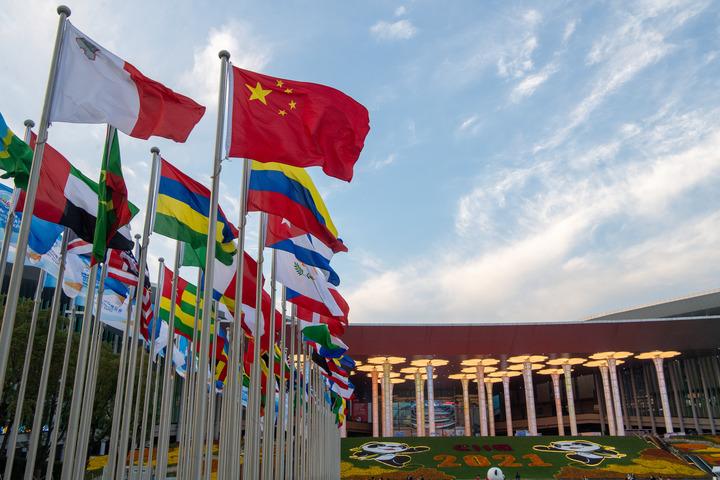What will a modern socialist China bring to the world?
BEIJING, Nov. 17 (Xinhua) -- Under the leadership of the 100-year-old Communist Party of China (CPC), China is seeking to become a "great modern socialist country" by the mid-21st century.
The modernization drive of the world's second largest economy, and the top trading nation in goods, is expected to bring huge dividends to a world plagued by the COVID-19 pandemic, surging protectionism and the growing threat from climate change.
As Xi Jinping, general secretary of the CPC Central Committee said, "China's development is an opportunity for the world."

A ceremony marking the centenary of the Communist Party of China (CPC) is held at Tian'anmen Square in Beijing, capital of China, July 1, 2021. (Xinhua/Li Ga)
NEW OPTION
Transforming and transcending, a modern China comes with a brand new approach, path and model, providing new possibilities for the ever-changing world.
China's peaceful rise, unprecedented in both scale and speed, has in fact shown that there has never been a one-size-fits-all development model, and the style adopted in the West is not the only viable route to modernity.
Although modernization theory has its origins in the West, modernization is by no means equal to Westernization. Beijing is determined not to follow the Western path of aggression, colonization and expansion, neither plundering and colonizing foreign countries nor transferring domestic conflicts and crises abroad in its modernization drive.
China, however, has no intention of selling its own development path to the world. The Chinese model of modernization offers a new option to other countries and nations who want to speed up their development while preserving their independence.
The communique of the sixth plenary session of the 19th CPC Central Committee said that the world's largest ruling party has "led the people in pioneering a uniquely Chinese path to modernization, creating a new model for human advancement, and expanding the channels for developing countries to achieve modernization."
IMMENSE OPPORTUNITIES
When a population of 1.4 billion crosses the threshold of modernity, enormous global opportunities will be unleashed. This is especially true when China is expected to continue to contribute, according to experts, between 25 percent and 30 percent of global economic growth in the next five to 10 years.
Chinese leaders have been reiterating the nation's willingness to invite countries around the world to "get on board the express train of China's development."
The recent fourth edition of the China International Import Expo, which has drawn nearly 3,000 businesses from 127 countries and regions, has showed China's willingness to further open its vast market. Over 70 billion U.S. dollars worth of tentative deals were reached for one-year purchases of goods and services at the "world-class platform."
China has been reiterating that it will not change its determination to open up at a higher level. Committed to shortening the negative list for foreign investment and protecting intellectual property rights, China aims to pursue a new round of opening up featuring institutional and systemic openness, thus creating a market system that is in line with international rules, regulations, management and standards.

A view of the south square of the National Exhibition and Convention Center (Shanghai), the main venue for the 4th China International Import Expo (CIIE), in east China's Shanghai. (Xinhua/Wu Huiwo)
Twenty years after China's WTO entry, the overall tariff level has dropped to 7.4 percent from 15.3 percent in 2001, lower than the 9.8 percent the country promised when entering the world trade body.
Multinationals are also expanding their footprints in China's thriving digital economy, whose market scale rose 9.6 percent year on year to 5.4 trillion U.S. dollars in 2020, ranking second in the world, according to a report from the China Academy of Information and Communications Technology.
In an increasingly fluid world, reform, a common task that almost every country faces, is one of the most important reasons behind China's transformation. British scholar and political commentator Martin Jacques has described it as "the most remarkable economic transformation in modern history."
The CPC has displayed a remarkable ability to reform, and it has pledged non-stop efforts in making reforms.
In its key development blueprint for the next five to 15 years, aimed at guiding the country's march toward modernization, China has pledged an array of reform measures. These include a high-standard market system, more market dynamics, as well as enhanced government economic governance capacity.
As was said by American economist David Blair, a prosperous China would be good for the rest of the world "because it provides markets, innovation and competition." China's deepened reform and its unswerving pursuit of high-quality development will benefit the world by providing fresh investment opportunities in a vast market that is opening wider.
Behind China's domestic policies and modernization drives, such as rural vitalization and the new development paradigm of "dual circulation," are immense investment opportunities.
China boasts a middle-income group of over 400 million people, the biggest in the world. Chinese consumers are also expected to reshape the global economic landscape.
The most recent proof of China's robust consumer market can be seen in the nation's demand for imported goods remaining solid during this year's Double Eleven shopping spree, in spite of supply chain disruptions caused by COVID-19.
Former Goldman Sachs chief economist, Britain's Jim O'Neill, told Xinhua that the Chinese consumer remains the most important economic development issue for China, and the world economy, for the next decade.
GREEN AGENDA
As China strives to become greener, no smart foreign businesses would want to miss out on the decades-long investment opportunity and broader market behind China's carbon-cutting pledge.
Since China's leadership announced last year the goal of achieving carbon neutrality by 2060, China has walked the talk. The latest example of the country's green efforts came at the 26th session of the Conference of the Parties (COP26) to the United Nations Framework Convention on Climate Change, where Beijing announced that it would foster a green, low-carbon and circular economic system at a faster pace, press ahead with industrial structure adjustment, and rein in the irrational development of energy-intensive and high-emission projects.
After the world's largest developing country completes the most dramatic reduction in carbon emissions intensity in just 30 years, it will not only benefit the massive transition of the Chinese economy to a low carbon one, but also bear great significance to the rest of the world.
The South China Morning Post said in a recent opinion article that a succession of practical measures from China might well prove an attractive template for other developing nations.

Volunteers patrol a forest area in east China's Zhejiang Province, July 20, 2021. The forest area covering some 22 hectares was launched in 2017 aiming to help reduce carbon dioxide emissions and achieve carbon neutrality. (Xinhua/Xu Yu)
NEW APPROACH
Fifty years after the restoration of its lawful seat in the UN, the People's Republic of China has been moving closer to the world's center stage. It was described by UN Secretary-General Antonio Guterres as "a strong supporter of multilateralism."
The world's most populous country has shown its deep understanding of the changing world by proposing a new approach to international relations, based on mutually beneficial cooperation and the principle of achieving shared growth through discussion and collaboration on global governance.
China does not intend to subvert the current international order and replace it with one that it dominates. China is committed to be a builder of world peace, a contributor to global development, and a defender of the international order.
The international order and governance system that China believes best suits the world, and best suits people of all countries, is something "that should be decided by all countries through consultation, and not by a single country or a few countries," according to Xi.
Photos
Related Stories
- CPC Central Committee's authority, leadership robust: resolution
- Booklet of resolution on CPC's achievements, experience over past century published
- CPC resolution stresses close Party-people ties
- Concept of human community with shared future a leading "banner": CPC resolution
- China's national rejuvenation "unstoppable": CPC resolution
Copyright © 2021 People's Daily Online. All Rights Reserved.










